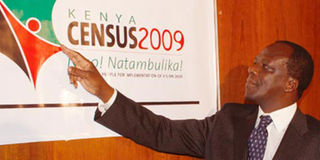Take a skills inventory in 2019 census

Former Planning Minister Wycliffe Oparanya when he unveiled the Kenya Census logo in 2009. FILE PHOTO |
What you need to know:
Labour is a key factor for economic growth and the contribution to the gross domestic product.
- Pertinent to having the right skills in the market is ensuring that educational institutions equip students with the right skills for the right market.
- Developed nations have a point factor rating system to analyse incoming labourers.
- Skills which are scarce rank highly with such a visa applicant more likely to get a work permit.
The next census is scheduled for August 2019. Censuses traditionally focus on population and housing, which helps in planning for a nation’s needs. However, it is prudent that we introduce some add-ons to help in collecting data that will not only lay the foundation for the country’s labour polices but also foster economic growth.
Labour is a key factor for economic growth and the contribution to the gross domestic product (GDP).
Post-Independence Kenya has been a headless chicken on matters labour. A country that boasts of being the regional powerhouse must take stock and plan appropriately for its labour by developing a skills inventory, whose benefits would be three-fold.
First, Kenya’s unemployment problem is mainly caused by a mismatch of what is being churned out by institutions of higher learning and market needs. A survey by jobs website Brighter Monday revealed that 53 per cent of the respondents were unemployed with 84 per cent (some employed) looking for work.
MISMATCH
My interpretation of this is, due to the mismatch of labour availability and the labour need, an individual will hold a job that they don’t necessarily possess the skills to execute or even enjoy to just to earn a living. This has caused the biggest retention headache for businesses.
A United Nations development index report rated Kenya’s unemployment at a staggering 39.1 per cent, citing skills deficits in the market viz-a-viz the demand as the biggest contributor. The market being flooded by skills that are not needed is what has led to thousands of jobseekers applying for two-candidate slot positions.
A skills inventory would help to show the excesses and shortages for appropriate planning from the economic, political, social, technological and legal aspects of Kenya’s growth.
So aloof is our labour data that the minimum wage guidelines are very limited with 90 per cent of the positions listed being obsolete as manufacturing and agricultural trends have changed since the rules were designed. This has left gray areas with employers often miscategorising staff, hence leading to under-payment.
SKILLS
Secondly, pertinent to having the right skills in the market is ensuring that educational institutions equip students with the right skills for the right market. Given that Kenya has been walking blindly since Independence, it is no wonder that educational institutions designed courses that made business sense to them and not necessarily to fill labour gaps.
The ‘Universities, Employability and Inclusive Development Project (2013-2016)’, a study commissioned by the British Council, found that around 49 per cent of new graduates are not adequately prepared for the labour market. This is quite alarming as Kenya heavily relies on universities to feed the labour market.
Conversion of technical, vocational education and training (TVETs) institutions to universities was a grave mistake, which I’m glad has been realised and the education policy makers are working hard to salvage the situation.
TVETs are critical in the labour eco-system. We need the certificate and diploma technicians as much as the degree holder — just so that we don’t have to import riveters from China to work on the standard gauge railway.
TRAINING
Taking an inventory on the skills — those in excess or scarce and matching them with national growth and economic agendas — will inform educational institutions on what training they can offer to contribute to national growth.
For instance, all this hullabaloo about Kenya positioning itself as an oil and gas magnet in the region is a mirage. The NYS school of oil and gas is still in the proposal stage.
Thirdly, Kenyans are losing jobs to foreigners. History has proven that doubling the work permit fees alone won’t cut it.
On Friday, Interior Cabinet Secretary Fred Matiang’i declared war on illegal foreign workers, giving them 60 days to register or be deported. Dr Matiang’i admitted that only 34,000 foreigners are on official records but the ministry suspects that the number could be more than 100,000.
EXPATRIATES
This blind walk can be solved by an inventory of skills to determine whether we require expatriates or not and encourage the scarce skills to come to Kenya and transfer them to locals with oversight from the Ministry of Labour and Social Services (an area in which they have failed miserably).
Developed nations have a point factor rating system to analyse incoming labourers. Skills which are scarce rank highly with such a visa applicant more likely to get a work permit.
May the 2019 census help Kenya’s economic growth and not just inform the politicians where to go on vote-hunting forays.
Ms Nderu is a freelance human capital strategist for SMEs. [email protected]




